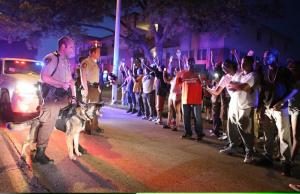President Obama held a press conference yesterday to address the ongoing crisis in Iraq and Ferguson.
Like many watching and commenting in real time on twitter, I found Obama’s comments on the situation in Ferguson lacking. Ezra Klein attempted to illustrate the source of our frustration: the incredibly polarized political landscape that prevents this president from ‘reaching across the aisle’ and ‘healing the nation.’ Citing Gallup polls and other data, Klein asserts that it is simply beyond this president’s power to bridge not just the divide that colors the way that we respond to racialized policing, but any partisan issue.
Still, while he accurately captures the forces that limit the president’s ability to ‘bridge the deep divides in American politics,’ Klein’s analysis ignores another choice that President Obama might have made: to challenge the rhetoric around policing, the logics that produce victims like Mike Brown.
President Kennedy did something similar 50 years ago in response to unrest at the University of Alabama when he stated “It ought to be possible in short for every American to enjoy the privileges of being American without regard to his race or his color.” We now take platitudes of this sort for granted, but when Kennedy made that statement public opinion was not in his favor—most white Americans looked with displeasure upon Blacks Americans attempting to desegregate schools and other public spaces in the South. So when Kennedy made his claim he was challenging the dominant political consensus of post-war America: that Blacks should not be too insistent in their demands for civil rights.
As several influential scholars have demonstrated, the dominant racial issue of the day in the unequal policing of the African American community. This is exacerbated by the fact that communities like Ferguson rely on the fines generated from tickets and civil-forfeiture to fund local government. Given this, Obama could have mentioned that communities should not create perverse incentives that necessitate arrests to fill the public coffers. He might have lamented the fact that in many counties in America, the number one employer is the local prison. He could have contrasted the incongruity of 20 years of falling crime being accompanied by ever greater rates of imprisonment. He might have taken Congress to task for blocking the confirmation of a lawyer to head the Office of Civil Rights at the DOJ. Instead of engaging these polices, Obama instead repeated the canard that more Black men are in jail than in college and touted the supposed virtues his My Brother’s Keeper program. Instead, Rand Paul’s statement on policing seems more progressive than the presidents.
Obama should know better. He should be capable of reaching beyond the immediate political calculus that Klein describes to challenge the structural assumptions of the nation. It seems, despite his cool and youthful demeanor that Obama is no Kennedy, and that’s a shame.


Reblogged this on Détour and commented:
Jonathan Gray’s take on Pres. Obama’s failure to use bully-pulpit to change discourse around Ferguson, MO.